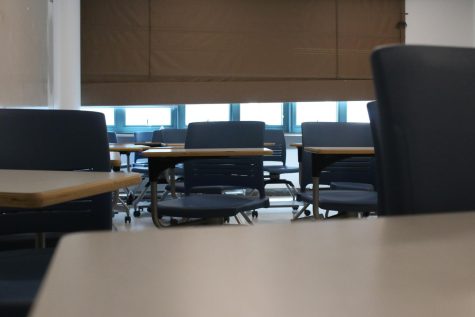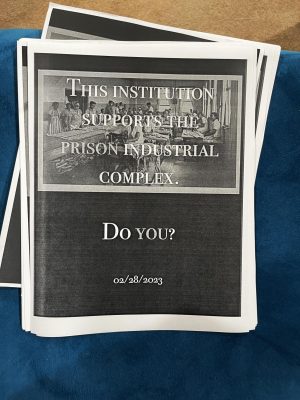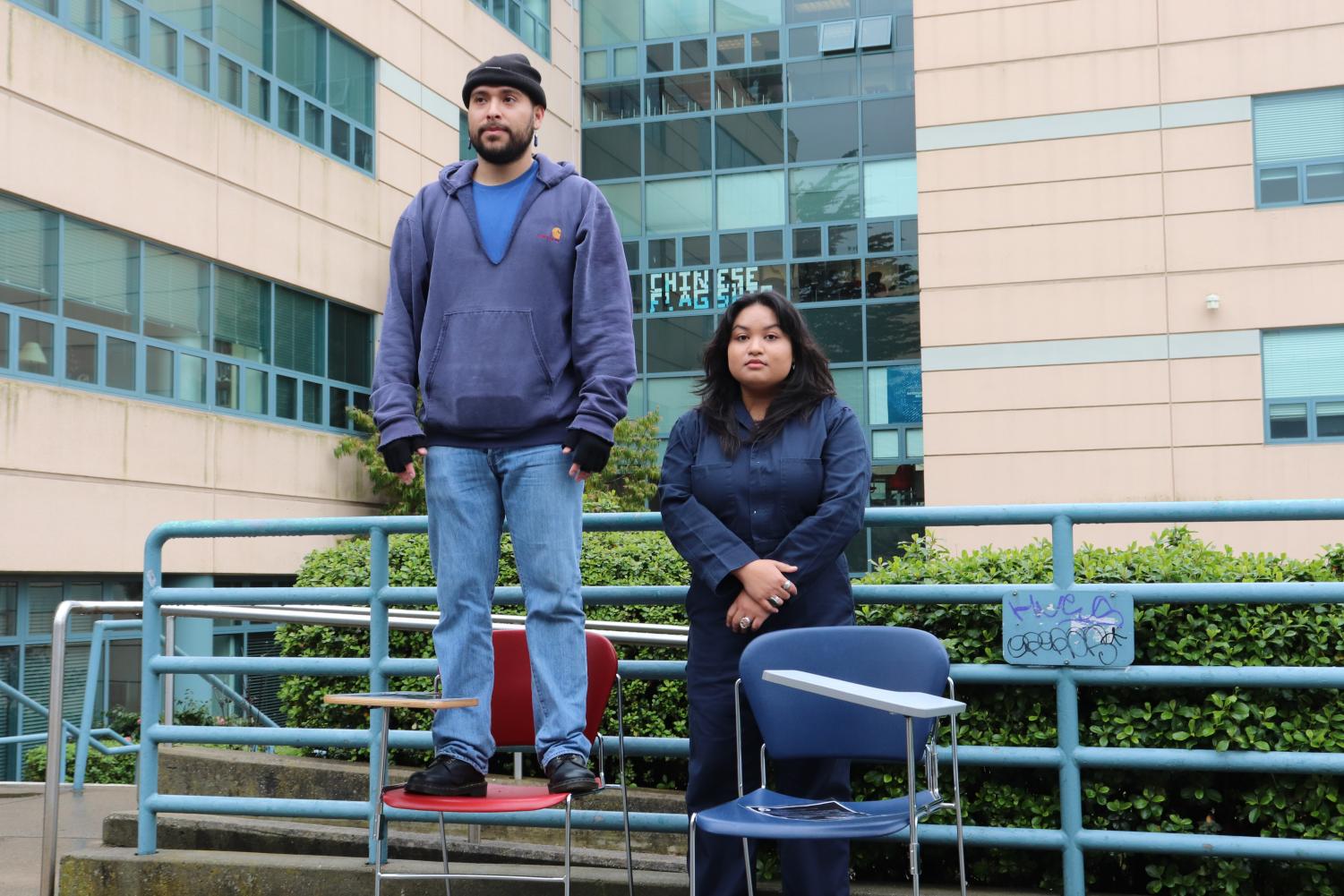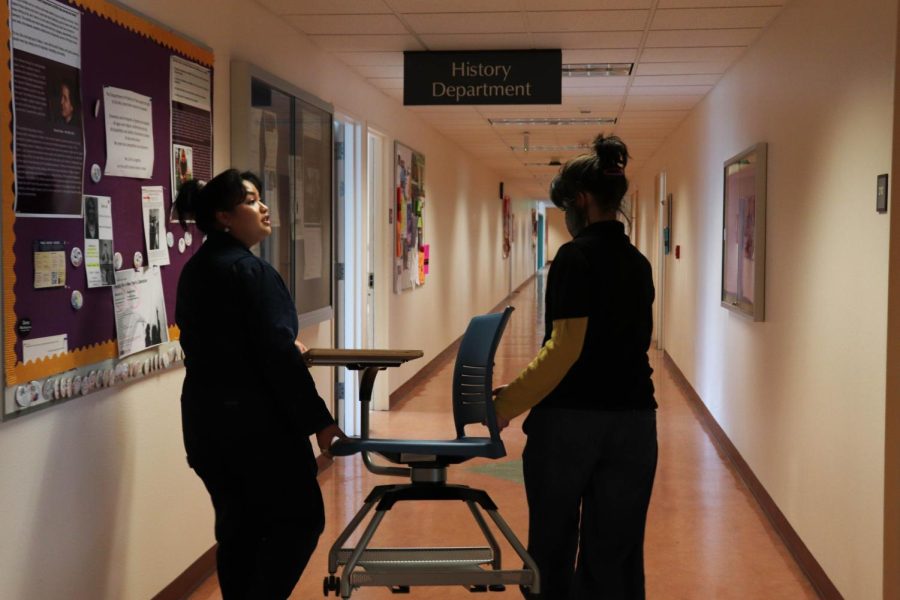
The ongoing debate on prison labor: is it a form of slavery?
The Coalition of Equity and Justice at SF State joins other universities to push social awareness about prison-made furniture on campuses.
May 24, 2023
Students who have spent years sitting in chairs and sleeping in beds that were made in prison factories are standing up to protest against their schools’ association with prison-made furniture.
University students in Wisconsin, Virginia, Maryland and New York have written petitions protesting universities’ purchase of prison-made goods and demanding fair wages for incarcerated workers.
At SF State, students formed the Coalition for Equity and Justice, weighing in on the ongoing debate about the benefits and inequalities of prison labor. Manufacturers claim prison labor is a way to lower the recidivism rate and increase incarcerated individuals’ skill levels. Students nationwide claim it goes against universities’ ideals and is a way to exploit incarcerated individuals.

According to the contract from the California State University Office of the Chancellor, provided by co-founder and president of the Coalition for Equity and Justice Sonia Espiritu, SF State awarded a $125,758 contract to furniture manufacturer Krueger International on Jan. 1, 2022. The Coalition for Equity and Justice believes SF State supports prison labor by purchasing from Krueger International.
Although Krueger International does not operate with prison labor, it is a distribution company that receives products produced by incarcerated individuals. A subdivision of Krueger International, Original Equipment Industries, is part of a vendor relationship with Unicor, which utilizes prison labor services at federal and state levels.
About the Coalition
Since joining the Coalition of Equity and Justice, Daniel Patinto, recruitment coordinator for the coalition, has pitched the ideals of the group to multiple classes. His passion for promoting the coalition across campus comes from shared stories of formerly incarcerated family members working unpaid labor.
“It’s really dehumanizing to have our prisons, you know, still incorporate slavery,” Patino said. “It is in the Constitution itself, but in my opinion, that [is] just bullshit. It’s inhuman to have that as any amendment.”
The Coalition for Equity and Justice was established in Fall 2022 and is divided into four pillars: legal research, outreach, general search and strategy communications. Within the pillars, members participate in areas where they feel comfortable in efforts to increase the campus’ social knowledge about prison labor. The coalition believes SF State should end all association with prison labor industries. Their goal is to create a call to action in order to cease the utilization of low-cost furniture.
On Feb. 27, members of the Coalition for Equity and Justice held a demonstration to show students how SF State is associated with Krueger International.
In pairs, the students carried out single chairs from different classrooms in the Humanities Building to the outside front entrance. They left coins and a flyer with information about SF State’s 2022 contract with Krueger International in place of the chair.
The 13th Amendment
Sav Perdon, co-founder and ex-president of the Coalition for Equity and Justice, said SF State’s contract with Krueger International acts as a loophole for the 13th Amendment.
Perdon’s interest in promoting awareness on campus comes from their study of political science and family members who have been incarcerated. Perdon brought up the argument during a senior seminar discussion, in the course Inequality in Politics taught by professor Ron Hayduk.
“They mentioned the 13th Amendment and how that abolished slavery and I corrected them; yeah, it abolished slavery, but there’s still that clause that slavery is legal as a form of punishment,” Perdon said. “My class was shook. Professor Hayduk was shocked. No one knew.”
In the course, students are required to research or execute a campaign on a topic of their choice. Perdon chose to start the campaign alongside Espiritu to highlight SF State’s association with prison labor manufacturer Krueger International.
Hayduk, after being made aware of the campus association with prison labor, believes it is rooted in structural inequality and racism dating back to the militia and slave patrols in the United States.

“Prison labor is a subset of the bigger problem of policing and incarceration, especially of young Black and brown folks in particular,” Hayduk said. “Prison labor is a further way to exploit those who are incarcerated.”
Under California state law, any able-bodied incarcerated individual is required to work during their term sentence. The Coalition for Equity and Justice focuses on how once an incarcerated individual is charged, they are automatically excluded from 13th Amendment protections.
In 2015, SF State purchased furniture from CALPIA— a state level prison labor industry— and Perdon believes SF State continues supporting prison labor with the newly awarded contract to Krueger International.
California state law provides prison-made products for state agencies to purchase. Per California Penal Code 2807, public universities are provided products and services with options to purchase at no cost to taxpayers and students.
About Unicor
Unicor — also referred to as Federal Prison Industries — is a U.S. government prison labor industry that provides incarcerated individuals employment during their sentence.
Unicor’s mission statement is to “protect society and reduce crime by preparing inmates with job training and practical work skills for reentry success.”
According to a 2022 study that began in 2010 and was conducted by the United States Sentencing Commission, 25,142 individuals were incarcerated and only 989, or 39%, participated in a work program.
In the same study, the recidivism rate for incarcerated individuals participating in work programs was 55%, compared to 52% of nonparticipants.
In 2021, Unicor reported the employment of 16,315 incarcerated individuals in its annual management report, missing its target goal of 18,000 workers. Although employment was low that year, Unicor’s leading sales came from office furniture, which increased by $22.1 million with a total gross profit of $14.9 million.
Jason Bell is the executive director of Project Rebound, a program supporting formerly incarcerated individuals through their academic journey. Bell worked as a teacher assistant through the California Prison Industry Authority while incarcerated, earning 17 cents an hour. He believes all levels of Prison Industry Authority are the same.
Bell mentioned joint venture programs that employ incarcerated individuals, but as soon as they are released, some are no longer hired. He believes the intention of career training in prison labor industries is ethical, but his beliefs shift if there is a profit motive.
“…You’re training people to be employed after release, but that hasn’t happened,” Bell said. “It’s basically telling people, you’re good enough to work for pennies, but not outside of prison. We don’t really want you here.”
The incarcerated workers are paid between 23 cents and $1.15 hourly, far below the federal minimum wage of $7.25 per hour. Their earnings are then further reduced to cover any remaining financial responsibility, such as incarceration fees and court-ordered fines.
“As far as the overlining intention, or what they tend to convince the public what they are actually designed for — training modules of career objective — I don’t believe that at all,” Bell said.
Moving Forward
The Coalition for Equity and Justice was disassembled in mid-March. Most of the students with leadership positions will graduate this spring and will no longer continue to advocate against the university’s contract with Krueger International.
Despite the end of the Coalition for Equity and Justice at SF State, prison labor industries continue to operate nationwide and the debate between the benefits and inequalities of prison labor continues.
Kent Bravo, media relations specialist for SF State, released this email statement in response to the coalition’s concern about the university’s relationship with Krueger International.
“After being made aware of this and investigating, we discovered this contract was implemented with a company whose subsidiary participates in the federal prison manufacturing program. SF State and the CSU currently adhere to rules which dictate processes for evaluating vendors who bid on our public contracts. We are currently examining the possibility of including considerations for additional factors – including how a vendor’s processes and policies align with the University’s mission and values.”



